Welcome back to our chat with NEO Scavenger developer Daniel Fedor. This is Part 2 (you can see Part 1 here) and we discuss the game itself, and the plans for its future.

Your first project is NEO Scavenger - which is a turn-based, quite traditional, RPG with an emphasis on crafting and survival. Tell us about that.
Turn-based play was actually a big consideration for me when I set out to make the game. I enjoy having the time to really consider my next action, to enjoy the problem solving, and not be pressured by time constraints nor other players. I enjoy twitch games too, but sometimes, I just want to sit down and leisurely enjoy a rich, challenging game.
The crafting and survival aspects of the game are largely borne of my love for post apocalyptic settings. In a post apocalyptic world, one has to look at items with new eyes, and imagine creative ways of using limited resources. It reminds me of my childhood days of scavenging junk to make forts, and rummaging through piles of Lego, trying to find a serviceable part for my creation. Post apocalyptic settings also offer the ability to tell two stories simultaneously: that of the world gone by, as well as those who live among its ruins.
RPGs also played a big role in my childhood. My friends and I would spend hours in elaborate campaigns, and even more time researching and designing settings, adventures, and characters between sessions. I wanted to capture the creative problem solving aspects I enjoyed so much from those games. Players will quickly notice that encounters in NEO Scavenger have multiple solutions, and I try to encourage these creative approaches.
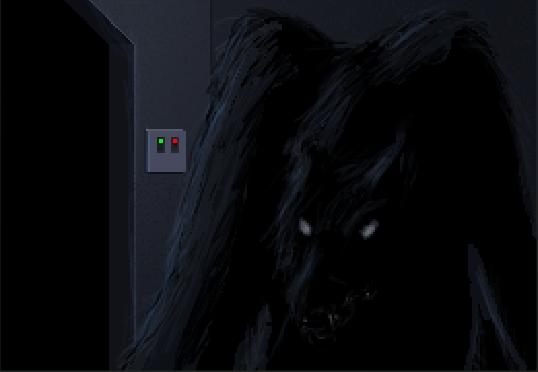
The game is quite "hardcore" - with (perma) death coming easily and often. Is this something that will be true of the final version, and what made you decide to take this approach?
As much as possible, yes, it will be a part of the final version. Knowing that everything is on the line makes decisions more interesting, and the game more compelling. There's this one quest, after the player has spent quite a while struggling to just stay alive, where they're presented with a foreboding building they must enter. I've had three separate people tell me that when they saw that house, they thought about all the times they nearly died trying to just stay fed and sheltered, and decided "nope, I'm not going in there."
That's exactly the kind of role-playing I was hoping for. If the player could just save their game before entering the house, and reload at any time later, they'd do just that. The mystery of the house wouldn't be a reward for the brave anymore, just more content to consume.
There are still some bugs to work out, though. Many things in the game can kill a player regardless of the player's preparedness, and that's not cool. Like in traditional RPGs, I want death to be something of a joint failure between the player and I. Either the player took an unnecessary risk, was lazy, or I didn't provide the necessary in-game tools. That'll take some work to sort out, but that's the goal.
There's also the question of how to handle death once the game's plot gets longer. I plan to extend the plot beyond what's currently in the demo and beta, and the longer that plot becomes, the more annoying death becomes. For now, death is a minor setback, and a chance to try a different approach. But if the plot gets long enough, death may be more frustrating than fun. There are ways to address that, and I'll have to see what works best. But I definitely want to maintain the "hardcore" feel that's there now. It's part of what sets NEO Scavenger apart from the "can't fail" games that exist.
There are lots of items in the game which give the player pieces of the back story. Is the plot and background of the game already all worked out? Or is that still being developed?
A good deal of work has been done creating the setting and overall plot structure, but details still need working out. Ultimately, NEO Scavenger takes place in a world in which I'd like to tell many stories. NEO Scavenger is meant to be a sort of introductory episode in a series of games in the same universe. So it'll reveal a pretty wide-but-shallow collection of setting and plot info, and leave further detail to future games in the setting.

You seem keen to involve your players in helping you develop the game, through the forum and by voting on features. Is this something which you think is important?
I definitely want players to feel like they have a voice. Part of the reason I started this whole enterprise was because I wanted more creative input into games, and this is a way to share that experience with customers.
The feature voting was an experiment with letting paying customers help drive the development priorities. Most studios will engage their customers in forums, and this can be a great way to get feedback. However, forums can often be misleading, as the volume of discussion may not accurately reflect the number of customers who care about it. Offering paying customers the ability to vote means that I'm seeing an accurate representation of what paying customers want, in proportion to the amount of money they think it's worth.
How many of the proposed features do you hope to be able to implement?
Everything! Seriously, though, the features up for voting are all ones that I'd like to see added, finances permitting. I have a vision for what I think the game should be, and the voting is meant to help with prioritizing that vision, rather than changing it.
If I had to choose only a few from that list, it actually wouldn't be too different than the current voting ranks. The game needs at least a little more plot work before I'd be satisfied. And combat is still really rough. I'd like to work out a richer system for that, allowing the same sort of creative latitude as the rest of the encounters in the game. I see the value in a larger resolution, though I could technically live without it. And the rest are mostly for variety more than anything.
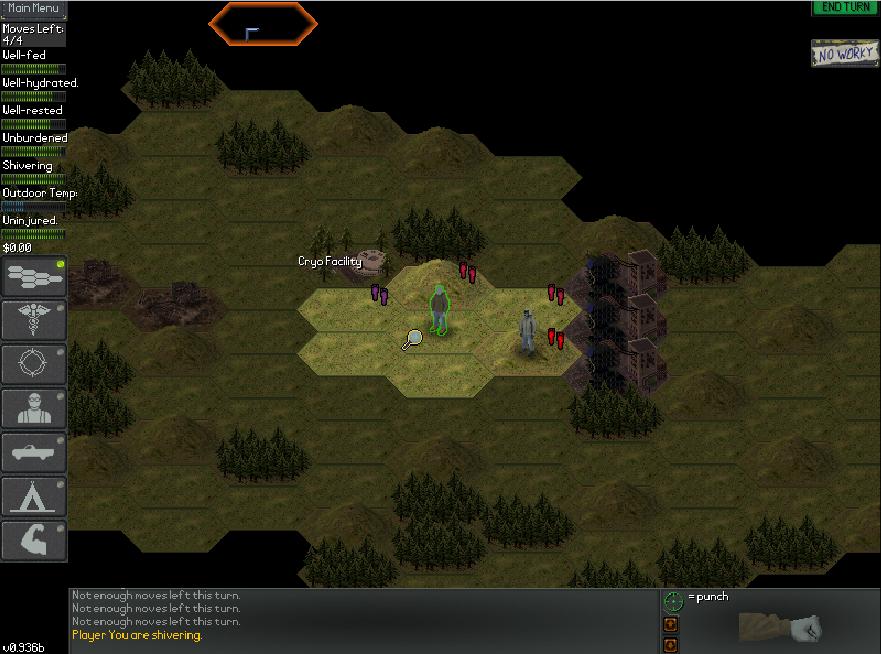
How important is it for you that people support the game now, while it is still in development? Would you be able to finish the game if people didn't do this?
If nobody had supported the game, I probably would've worked on a bit more plot, wrapped it up, and moved on to a new game. Having people support the game early has allowed me to do a huge amount of refinement to NEO Scavenger, including adding some new features. In particular, the new day/night, visibility, AI, and camp additions were mechanics which probably would've been skipped without outside support and feedback. So having people participate in both the funding and design of the game was a big deal.
I'm not sure how much more I can afford to work on before I need to move on, but extending the plot is still an obligation I'm imposing on myself. Even if I had to go get a job at the supermarket to pay the bills tomorrow, customers at least deserve some more plot.
So, with all this in mind, when do you think you’ll be able to release the game?
A final version? It's hard to say. Probably no sooner than June 2012, if I were to start wrapping up plot work tomorrow. I estimate it'd take at least that long to create and test the content. However, if pre-sales pick up again, it might be enough to fund a new feature or two, so that would protract the schedule.
Ideally, I'd have enough funds to flesh out the plot some more, fix up combat and wounding, and add some extra variety to the game's collection of items and creatures. I could then start selling a downloadable copy from my own site, as well as shop it around other channels, such as Steam and Desura. And hopefully it would be enough to start work on future installments, probably with a continuation of the plot. I could see this option taking more like 3-4 months to complete.
So sometime in the summer, perhaps? Of course, my original estimation was 4 months all-told, for a September 2011 release. We can see how accurate that was!
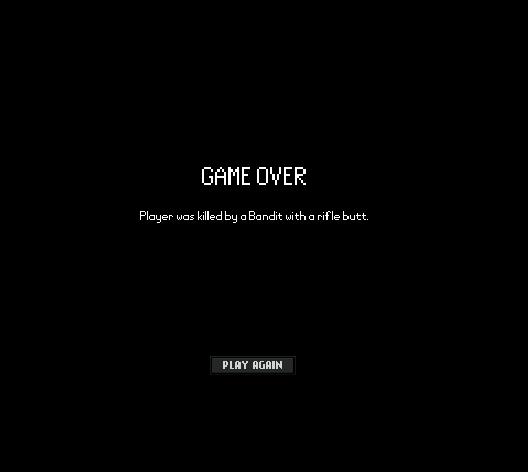
So, there you have it. We’re very excited about this game. Hopefully some of you are too and will want to support it, and enable Daniel to put in all the features that he has planned. Don’t forget that you can do that, and much more, on the website.
We would like to say thanks to Daniel for answering all of our questions. Don’t forget to check back here once the game is finished for a full review!
If you’re a reader of the Indie Review (and if not, why not?) then you may remember that we recently flagged up NEO Scavenger as “One to Watch”. For those of you who don’t know, NEO Scavenger is a post-apocalyptic, turn-based, survival RPG currently in development by Blue Bottle Games. There is a playable demo available on their site, and you can support them with actual money in return for access to the current beta build (and the full game when available.)
We recently got the chance to talk to Blue Bottle head honcho Daniel Fedor about, well everything really - from career choices to the game itself. This, here, is Part 1 of that chat and we cover Daniel’s background and his inspirations. Tomorrow we’ll give you Part 2 - in which we talk more specifically about NEO Scavenger, how it’s got to where it is now and what the plans are for the future.

So, what made you want to leave a big company, like Bioware, and take the leap into the relative insecurity of being an indie games developer?
I think it was creative freedom, more than anything else. At a company like BioWare, you've got 800 employees spread across maybe half a dozen projects, and most of them want creative input. Even in the most democratic situations, that doesn't amount to a lot of creative input per person.
What's more, the roles I was hired into aren't ideal for someone who wants to design games and make them reality. As a tech artist, I was mostly in charge of tools and art pipelines. And as an associate producer, it was more facilitation and administrivia. Rarely did I get a chance to design a game system, write code for it, draw art for it, or tinker in writing, audio, or business analysis. I longed for an opportunity to really let loose and try some ideas out.
I did have the pleasure of working on two small research projects there, however. In each, I was part of a small team, and we got to experiment with gameplay and systems. Given the team size, we all had a lot of input, and had to wear many hats. They were some of the greatest moments in my career. They were brief, though, and years apart. I wanted more of that.
How is that decision going? Any regrets?
I love it! So far, it's been a steady trip to the poor house, but every dollar spent has been worth it. I get an enormous amount of satisfaction out of my job each day, and I feel it has really catapulted my skill development. One could say it was an investment in myself. It still may pay off, if I can manage to make something salesworthy and get enough exposure. However, even if it doesn't, I've got a game that I love, a company I'm proud of, and a few hundred fans who like my work. And if I ever want to go back to working for someone else, perhaps I can get into a role with more creative input now. That's a pretty good worst-case!
Do you have any advice for other people thinking of doing the same thing?
Yes, a ton of it! Part of my goal in going indie was to document the process and share it with others. That documentation is in the form of my blog: “game dev gone rogue”
In it, I share learned wisdom from my successes and failures, including finances, motivation, public relations, creativity, and more. Blogs like mine were what helped me prepare for my journey, so I hope to do the same for others.
If I had to choose a few of the more important lessons, one would definitely be to give yourself enough financial breathing room to make a serious go of it. You'll need at least a year to find your footing and release a game. Maybe more. I just crossed the 1-year anniversary of my resignation from BioWare this month, and I'm still not profitable.
Which segues nicely into another important lesson: start small. I failed to limit the scope of my first game, and instead of having a few games done by now, I have one game partially done. That's bad for business, as it puts all my eggs in one basket. If NEO Scavenger fails to be profitable, I'm broke and looking for a job. If I had done a few smaller games, I'd have more chances at one of them being profitable enough to sustain me.
Finally, I'll borrow some wisdom from John Romero: stop waiting for permission. I think I was one of the people he described, who thought that if I just go through the motions long enough, someone will walk up to me and say, "now it's your turn. What game do you want to make?" Well, there's only one person in the universe who's ever going to say that to you: you.
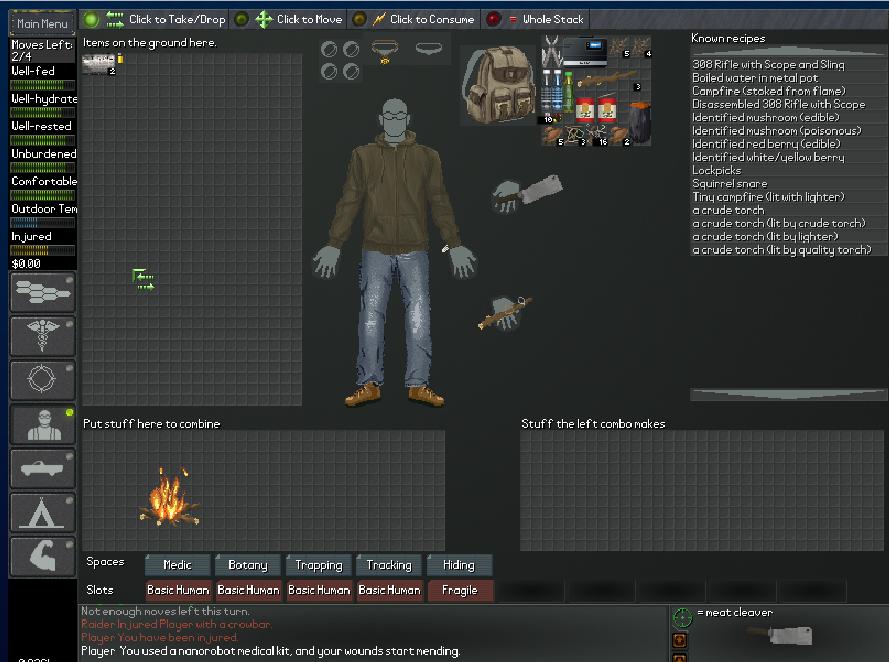
You describe yourself as a "huge RPG nerd". Which games have inspired you?
As kids, we played a ton of AD&D. Pretty much all of the campaign settings. We also played quite a bit of Rifts and Shadowrun. Outside of those, we dipped our toes in Car Wars, Traveller, Twilight 2000, Mage: The Ascension, and GURPS, and I bought at least half a dozen RPGs just to enjoy reading the rules and settings.
In the realm of video games, I was big into CRPGs like Fallout, Shadowrun (Sega Genesis), Baldur's Gate, Arcanum, Nethack...man, this could be a long list. Looking over the stuff on my shelf, I think there are definitely some front-runners in the list of direct inspiration.
Rifts is a big one, for sure. I really enjoyed the mix of sci-fi and supernatural horror in a post apocalyptic setting. It went a bit bonkers, true, but the core concept was really cool to me. Arcanum had a similar tech/magic mixture, and offered a cozy paradise for the scavenging type.
GURPS's mechanics were always fascinating to me (and therefore Fallout's). The idea that one chooses a balance of advantages and disadvantages really grew on me later in life, as it forced more interesting role-playing and problem solving. You'll find that direct influence in NEO Scavenger right from the start, when choosing skills and traits.
The GDW games like Traveller and T:2000 were awesome because of their attention to detail and realism. I like my science fiction moderately hard, and most of the tech in NEO Scavenger is meant to be plausibly grounded.
Finally, the way magic is handled in Mage: The Ascension is really attractive to me. That it works in various and mysterious ways, and cannot be fully understood nor explained, is really cool to me. I'm annoyed by games where magic is formulaic to the point where a spell is just a +/- stat and one of the four Greek elements. Old D&D had some cool magic: the kind that was so idiosyncratic and full of contradictions that it felt like a forbidden art. If I can capture the mystery and power of magic like they did, I'll be happy.
There are a ton of other games that inspired NEO Scavenger, which itself is really just a collection of things I like from gaming. The S.T.A.L.K.E.R. series, Deus Ex, Civilization, Silent Storm, Nethack...there are just so many games I've been influenced by, it'd be hard to list them all.
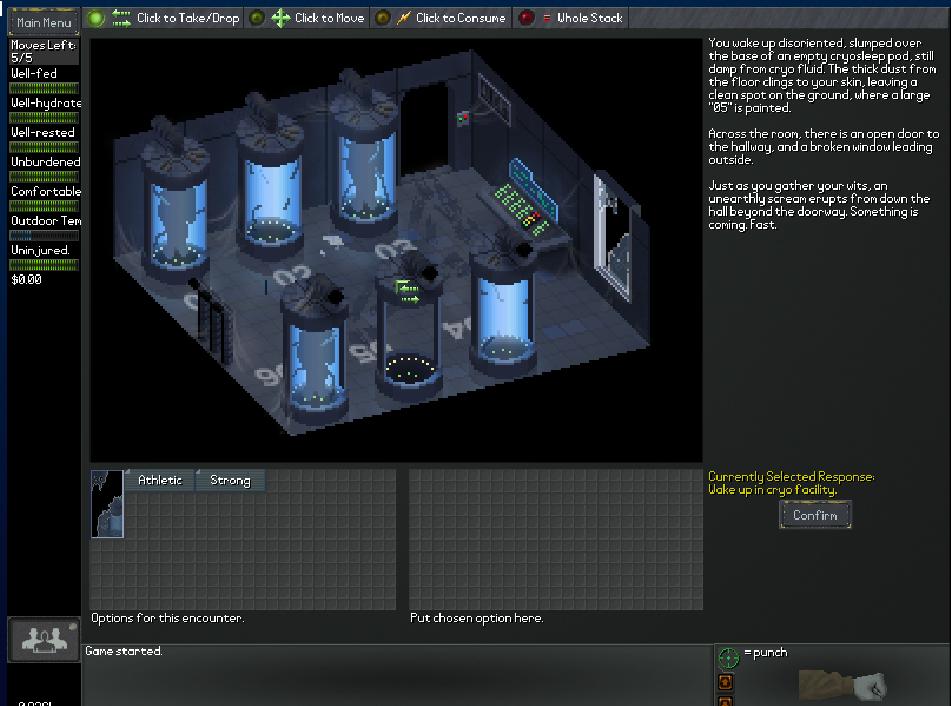
Why do you think classic CRPGs like this stopped getting made?
It's just capitalism at work. Market pressures and development costs drive much of what we see in the games market. Most studios try to find the intersection of games they want to make with games they can afford to make. If more people throw down cash for games like Call of Duty, more games like Call of Duty get made.
Once in a while, a studio decides to take a risk and make something different. Most of the time, it's a failure, and that behaviour is punished by bankruptcy. Very occasionally, it's a hit, and then there's a new gold rush to that genre.
Do you think they're coming back into fashion?
The hand-painted, turn-based, isometric CRPGs many of us fell in love with faded away because other genres were a better bet, financially. They just evolved out of the market. The reason we're starting to see them crop up again is because the cost of making and publishing them has gone down. I can write a game using off the shelf tools for a fraction of the cost and effort it took a decade ago, and then sell it through an increasing number of channels, including my own website.
When the barriers drop like that, we see more games with more variety. It enables people like me to afford taking the risk.
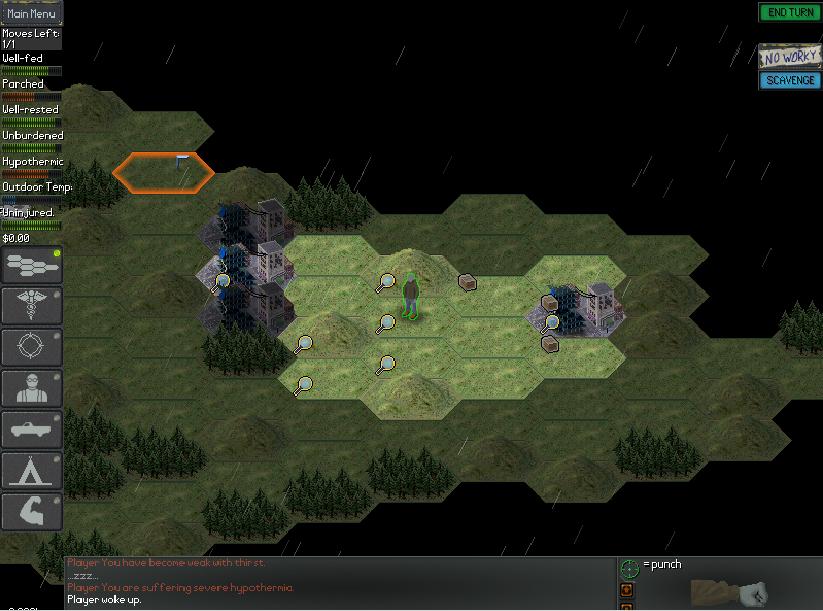
Your website says that you want to "try to leverage piracy as a tool". What does that mean?
Ultimately, I want people to play my game, and I want to keep making games. As long as those two things are true, I'm happy. Piracy means more people are playing my game, so the only real question is whether piracy diminishes my chances of continuing to make games.
I think that sites like Good Old Games have realized that people who are going to buy the game will do so even if it's available to pirate. I tend to agree. Customers will be customers, and pirates be pirates. If you believe that, then piracy doesn't negatively impact sales. It just means more people play the game, talk about it, and maybe that reaches the ears of additional customers. Piracy can actually be a valuable advertising tool for a cash-strapped indie with no marketing budget.
Besides, DRM takes time to make, which could otherwise be spent adding value to the game. And since adding DRM risks annoying customers and, at best, only delays piracy, it seems like a really bad investment.
And that ends the first part of our interview... be sure to check back tomorrow - when we’ll be talking about the game itself. (You can see Part 2 here)